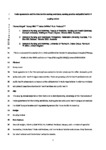Trade agreements and the risks for the nursing workforce, nursing practice and public health: A scoping review
| dc.contributor.author | Kidgell, D | |
| dc.contributor.author | Hills, D | |
| dc.contributor.author | Griffiths, D | |
| dc.contributor.author | Endacott, Ruth | |
| dc.date.accessioned | 2020-07-14T11:07:30Z | |
| dc.date.issued | 2020-09 | |
| dc.identifier.issn | 0020-7489 | |
| dc.identifier.issn | 1873-491X | |
| dc.identifier.other | 103676 | |
| dc.identifier.uri | http://hdl.handle.net/10026.1/16020 | |
| dc.description | 12 months embargo | |
| dc.description.abstract |
BACKGROUND: Trade agreements in the 21st century have evolved to include provisions that affect domestic public policy and public health in signatory countries. There are growing calls for health professionals and public health advocates to pursue an active advisory role in trade negotiations in order to anticipate and prevent negative outcomes for health services and public health. AIM: This scoping review explored current literature to identify existing knowledge of the implications of trade agreements for the nursing workforce, nursing practice and public health using as an example the 2018 'Comprehensive and Progressive Agreement for Trans-Pacific Partnership'. DESIGN: Scoping review DATA SOURCES: Emerald Insight, Informit, Ovid MEDLINE, PubMed, ProQuest, Scopus, and a number of specialist Economics, International Trade and Business, and International Relations databases. Grey literature included national and international policy documents. REVIEW METHOD: Literature was selected according to extraction field criteria, supplemented by hand searching of relevant grey literature and snowballing references from the selected literature reference lists. Analysis was undertaken to identify key themes emerging from the literature. REVIEW RESULTS: Six key themes relevant to nursing workforce, nursing practice or public health were 1. Lack of consultation with public health and health professionals in trade negotiations; 2. Implications of strengthened intellectual property provisions for equitable access to medicines (including biologics) and medical devices; 3. Threats to government capacity to regulate domestic policy for public health and health services through 'Investor State Dispute Settlement' provisions 4. Threats to government capacity to regulate domestic policy for public health and health services through 'Regulatory Coherence' 5. Potential limited benefits to communities and increased health inequities 6. Potential implications of increased temporary migration. Gaps were identified in the literature for implications for nursing practice and the nursing workforce from regulatory and labour provisions of trade agreements. CONCLUSIONS: The analysis of the literature reviewed is of international importance for the nursing workforce, nursing practice and public health. Policymakers must anticipate and respond to how the inclusion of labour or regulatory provisions in trade agreements will affect nursing practice and the nursing workforce, and how this may subsequently impact on the health of communities globally. | |
| dc.format.extent | 103676-103676 | |
| dc.format.medium | Print-Electronic | |
| dc.language | en | |
| dc.language.iso | en | |
| dc.publisher | Elsevier BV | |
| dc.subject | Nursing | |
| dc.subject | Nursing workforce | |
| dc.subject | Public health | |
| dc.subject | Scoping review | |
| dc.subject | Trade in services | |
| dc.subject | Trade agreement | |
| dc.subject | Health services | |
| dc.title | Trade agreements and the risks for the nursing workforce, nursing practice and public health: A scoping review | |
| dc.type | journal-article | |
| dc.type | Journal Article | |
| dc.type | Review | |
| plymouth.author-url | https://www.webofscience.com/api/gateway?GWVersion=2&SrcApp=PARTNER_APP&SrcAuth=LinksAMR&KeyUT=WOS:000578971400033&DestLinkType=FullRecord&DestApp=ALL_WOS&UsrCustomerID=11bb513d99f797142bcfeffcc58ea008 | |
| plymouth.volume | 109 | |
| plymouth.publication-status | Published | |
| plymouth.journal | International Journal of Nursing Studies | |
| dc.identifier.doi | 10.1016/j.ijnurstu.2020.103676 | |
| plymouth.organisational-group | /Plymouth | |
| plymouth.organisational-group | /Plymouth/Faculty of Health | |
| plymouth.organisational-group | /Plymouth/Research Groups | |
| plymouth.organisational-group | /Plymouth/Research Groups/Institute of Health and Community | |
| plymouth.organisational-group | /Plymouth/Users by role | |
| dc.publisher.place | England | |
| dcterms.dateAccepted | 2020-05-31 | |
| dc.rights.embargodate | 2021-7-7 | |
| dc.identifier.eissn | 1873-491X | |
| dc.rights.embargoperiod | Not known | |
| rioxxterms.versionofrecord | 10.1016/j.ijnurstu.2020.103676 | |
| rioxxterms.licenseref.uri | http://www.rioxx.net/licenses/all-rights-reserved | |
| rioxxterms.licenseref.startdate | 2020-09 | |
| rioxxterms.type | Journal Article/Review |


